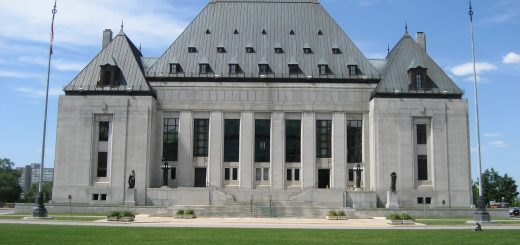PS v Ontario: ONCA Finds Ontario Mental Health Law Breached the Charter
The Ontario Court of Appeal’s judgment in PS v Ontario, 2014 ONCA 900, has determined that a detainee in a mental health institution suffered discrimination and a denial of procedural fairness, contrary to his Charter rights under Sections 15 and 7. The case arose from the 19-year-long involuntary detention of a man, identified only as PS, at a mental health institution. Ontario’s Mental Health Act, RSO 1990, c M.7 [MHA], permitted PS to be institutionalized for an indefinite period of time, but failed to provide a procedural mechanism for PS to meaningfully challenge the conditions of his therapeutic treatment. For PS, who has been deaf since childhood, these conditions resulted in a lack of access to deaf-appropriate treatment during his detention.
Overturning the decision of an application judge and finding a violation of PS’s Charter rights, the Court of Appeal severed those portions of the MHA that allowed for the indefinite detention of involuntary mental health patients – thereby limiting the term of such detentions to 6 months. By recognizing an involuntary mental health patient’s interest in recovery as a necessary core consideration for mental health law, the Court of Appeal’s decision marks a significant advancement in civil rights for individuals with mental illnesses.
The Facts
After completing a 45-month prison sentence for sexually assaulting a minor, PS was detained for 19 years at a mental health institution. On the day before his release from the Kingston Penitentiary in 1996, PS was transferred to the Penetanguishene Mental Health Centre (“PMHC”). In accordance with the MHA, PS was detained for three days and assessed by psychiatrists at the PMHC after a Form 1 application for his involuntary detention was completed by a psychiatrist. Following this assessment, PS was diagnosed with pedophilia-paraphilia and admitted as an involuntary patient at Oak Ridge, the maximum security division of the PMHC.
The MHA permitted PS’s involuntary detention to be repeatedly renewed for 3 additional months as long as psychiatrists at Oak Ridge determined that his illness was likely to result in serious bodily harm to himself or other persons.
In addition to being diagnosed with pedophilia, PS had been deaf from an early age. His childhood disability, history of abuse by family members, and subsequent placement in a succession of foster homes left PS with a limited ability to communicate in either spoken or signed language. However, PS was not able to access deaf-appropriate treatment at the PMHC until 2003, after having been detained for approximately seven years. Following this accommodation, his understanding of treatment and his willingness to participate markedly improved.
Reviews by the Consent and Capacity Board
The Consent and Capacity Board (“the Board“) is required to review all involuntary detentions under the MHA on every fourth renewal of such detention or, otherwise, at the request of the patient. Having reviewed PS’s involuntary detention numerous times in the course of 19 years, the Board repeatedly recommended changes to his treatment, but lacked the power to issue orders accordingly.
In its reviews of PS’s detention, the Board focused on his ongoing inability to recognize that his criminal sexual acts were wrong, as evidenced in the reports of psychiatrists who had treated PS. This led the Board to repeatedly determine that PS posed a public safety risk that justified his involuntary detention.
At the same time, the Board repeatedly found that different conditions were needed to provide PS with the treatment needed to address the risk he posed and open the possibility of his release. In particular, the Board found that PS did not pose the sort of danger that necessitated his detention at a maximum security facility where he also had limited access to deaf-appropriate services. Despite these recommendations, medium security facilities refused to admit PS, and the Board could not issue an order for PS to be transferred to a different security level.
The Decision of the Application Judge
On finding that the conditions of his detention remained unchanged despite the Board’s findings, PS brought an application to the Ontario Superior Court in 2007. PS alleged that his involuntary detention at Oak Ridge violated his Charter rights under Sections 7, 9, 10(a), 12 and 15. With respect to Section 15, PS claimed that his inability to access deaf-appropriate services constituted discrimination. With respect to Section 7, PS claimed that his lack of a meaningful procedural remedy to address the conditions of his treatment constituted a deprivation of liberty contrary to the principles of fundamental justice. Accordingly, PS sought to have numerous sections of the MHA declared as having no force and effect.
The application was denied by Justice McCarthy of the Ontario Superior Court, 2013 ONSC 2970.
With respect to Section 7, the application judge found that the Superior Court’s judgment in Starnaman v Penetanguishene Mental Health Centre (1995), 24 OR (3d) 701, had “conclusively” established that the MHA “complies completely with the procedural component of the principles of fundamental justice.” Even if PS had been denied procedural rights through his inability to access deaf-appropriate services, the application judge found no evidence to indicate that this would have changed his diagnosis and the outcomes arising from it.
With respect to Section 15, the application judge determined that PS had suffered discrimination that breached his Charter rights, but determined that the breach was only historical and not ongoing. Accordingly, no remedy was granted.
The Court of Appeal
Although the PMHC was divested from the Province of Ontario in 2008 and became a public hospital corporation (Waypoint Centre for Mental Health), a five-judge panel of Ontario’s Court of Appeal determined that the Charter applied to the hospital’s administration of involuntary detention under the MHA. Following Eldridge v British Columbia (Attorney General), [1997] 3 SCR 624 [Eldridge], the Court of Appeal affirmed that the province “cannot ‘contract out’ of its Charter responsibilities by contracting statutory powers to a private entity.”
Reversing the application judge’s decision, the Court of Appeal found that PS had suffered a breach of his rights under sections 7 and 15 of the Charter and that neither breach was saved by Section 1. Applying remedial powers under section 52 of the Charter, the Court of Appeal ordered severance of MHA provisions that permitted indefinite detention of involuntary patients such as PS – making 6 months the maximum length of such detentions. The declaration of severance was suspended for 12 months so that Ontario’s government could respond with legislative changes.
The Breach of Section 7
By failing to provide the Board with powers it needed to “ensure that the conditions of a person’s long-term detention are tailored to reflect the person’s actual level of risk, moving towards their ultimate integration,” the MHA was found to have given rise to a violation of PS’s Section 7 rights. Specifically, the Court of Appeal highlighted the Board’s lack of powers to order community treatment, treatment at a lower security facility, or treatment designed to accommodate physical or sensory disabilities such as deafness in the case of PS.
The Breach of Section 15
The Court of Appeal determined that the application judge had “mischaracterized the extent and nature of the violations of the appellant’s s 15(1) rights.”
Following Eldridge, the Court of Appeal affirmed that non-discriminatory health care practices require the “regular provision of communication through deaf appropriate services.” The Court of Appeal found that the application judge’s failure to consider material evidence pointing to the PMHC’s failure in this regard constituted a reversible error. Further, the Court of Appeal determined that the application judge misapprehended evidence in finding that written communication and gestures sufficed to accommodate PS’s communication needs.
According to the Court of Appeal, the breach of Section 15 added to the gravity of the Section 7 breach that constituted the heart of PS’s complaint against the MHA.
Implications
It remains to be seen whether Ontario will appeal to the Supreme Court of Canada. However, so long as the Court of Appeal’s decision stands, it calls for an important shift in the balance to be struck in Ontario’s mental health law. Prior to the Court of Appeal’s decision, the nature of involuntary detention under the MHA depended primarily on balancing public protection against patients’ best interests as determined by medical professionals. This left little room for patients themselves to play a role in determining the course and nature of their treatment.
The Court of Appeal’s judgment effectively states that this balance must be changed by providing meaningful procedural avenues for patients to seek the accommodation and treatment they need to be rehabilitated while being involuntarily detained. The Court of Appeal’s decision indicates that Ontario cannot wield the power to detain mental health patients indefinitely where such procedural protections are absent.
Underlying the Court of Appeal’s decision is an important shift away from traditional views of mental health institutions as warehouses designed to protect society from permanently afflicted individuals, and towards a view of these institutions as places of recovery designed to facilitate the reintegration of patients into society. For advocates of the civil rights of individuals with mental illnesses, this marks a significant step towards substantive equality.








Join the conversation